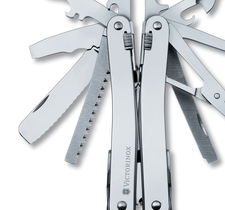Platform-independent toolkit – Swiss File Knife
SwissArmy Knives

© Lead Image © Victorinox, PHOTOPRESS
Swiss File Knife replaces more than 100 individual command-line tools at once, but it still fits on a USB stick and runs on all major operating systems.
If you work on the command line, you inevitably use many utilities and tools, all of which work differently, especially if you have to switch between operating systems. To simplify your life, take a look at Swiss File Knife (SFK) [1]: This tool replaces many conventional command-line programs with functions that operate consistently and follow the same syntax across operating systems. Additionally, SFK offers a way to combine individual commands in scripts. A short overview of the tool's many options is given in the "Swiss File Knife Capabilities" box.
SFK is available as a precompiled program with no dependencies, so you can take it anywhere you like on a USB stick and use it for on-site maintenance or rescue work. In addition to 32- and 64-bit binaries for Linux, you will find versions for the Raspberry Pi and other ARM machines, as well as Windows and Mac OS X, allowing you to work on all the major systems with the same tool.
Choosing your Weapons
All versions of SFK can be found on the tool's SourceForge page [2] below Files | 1-swissfileknife | <version> (v1.7.2 when this issue went to press). In the list, then click on the EXE file for your system, which you can identify by looking at the file name.
[...]
Buy this article as PDF
(incl. VAT)
Buy Linux Magazine
Subscribe to our Linux Newsletters
Find Linux and Open Source Jobs
Subscribe to our ADMIN Newsletters
Support Our Work
Linux Magazine content is made possible with support from readers like you. Please consider contributing when you’ve found an article to be beneficial.

News
-
Chaos Comes to KDE in KaOS
KaOS devs are making a major change to the distribution, and it all comes down to one system.
-
New Linux Botnet Discovered
The SSHStalker botnet uses IRC C2 to control systems via legacy Linux kernel exploits.
-
The Next Linux Kernel Turns 7.0
Linus Torvalds has announced that after Linux kernel 6.19, we'll finally reach the 7.0 iteration stage.
-
Linux From Scratch Drops SysVinit Support
LFS will no longer support SysVinit.
-
LibreOffice 26.2 Now Available
With new features, improvements, and bug fixes, LibreOffice 26.2 delivers a modern, polished office suite without compromise.
-
Linux Kernel Project Releases Project Continuity Document
What happens to Linux when there's no Linus? It's a question many of us have asked over the years, and it seems it's also on the minds of the Linux kernel project.
-
Mecha Systems Introduces Linux Handheld
Mecha Systems has revealed its Mecha Comet, a new handheld computer powered by – you guessed it – Linux.
-
MX Linux 25.1 Features Dual Init System ISO
The latest release of MX Linux caters to lovers of two different init systems and even offers instructions on how to transition.
-
Photoshop on Linux?
A developer has patched Wine so that it'll run specific versions of Photoshop that depend on Adobe Creative Cloud.
-
Linux Mint 22.3 Now Available with New Tools
Linux Mint 22.3 has been released with a pair of new tools for system admins and some pretty cool new features.
